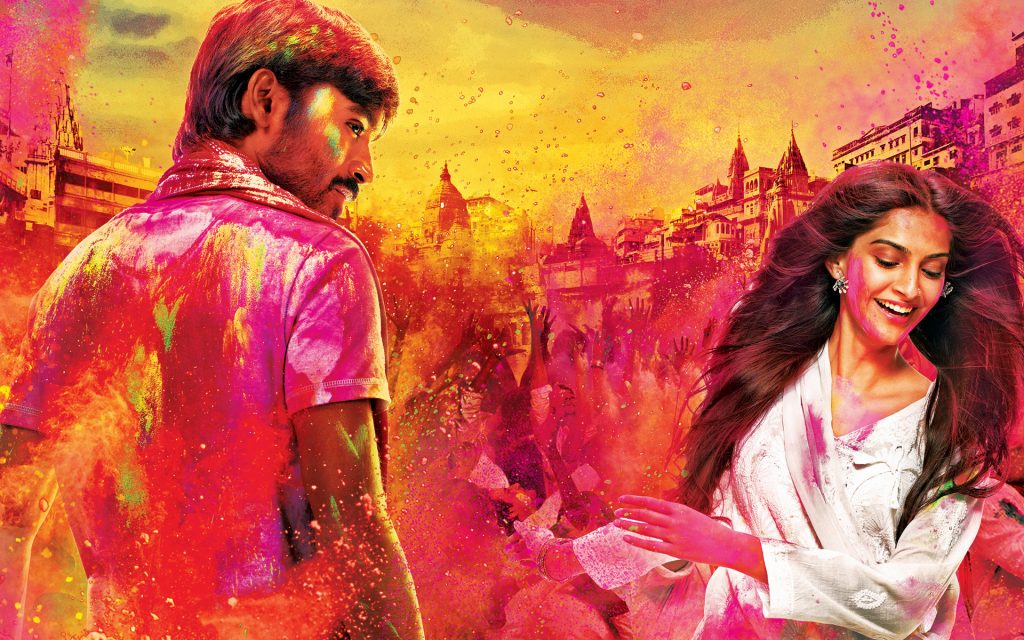Kundan (Dhanush) is a small-town boy in Banaras that relentlessly pursues his childhood love Zoya (Sonam Kapoor), right from their school days to the day she comes back from an urban Delhi college. He remains steadfast in his love, while she lets time take its toll and falls in love with Akram (Abhay Deol), a socialist student party leader back in JNU (Delhi)…
Rarely do Indian film critics find themselves in a position where they’re literally rooting – pompoms and all – for a film to end as well as it has begun. For better or worse, Hindi films have always been a tale of two halves. That’s how films are structured, written and designed- it has its advantages and pitfalls. During the interval for Raanjhanaa, there was a palpable buzz in the press show. You couldn’t smell critics baying for blood, you could only feel a few hundred hearts and minds drenched in hope, muttering: Something good is happening. Please let it continue to happen. Don’t fade away. Do not fail us now.
Anand L Rai, the director, had done this once before with Tanu weds Manu. After a cracking first half, a wild directionless second half luckily didn’t do much damage to its BO collections. With Raanjhanaa, also South Indian star Dhanush’s Bollywood debut, Rai succeeds in giving us a complete package – a film that combines everything that Indian cinema is famous for, in a largely entertaining manner, and yet manages to touch wide ranging issues from religion to student politics to revolutions in the most effective screen representation yet. He even manages to take lighthearted digs at the purported holiness of tourist-invaded Banaras and the famed militant activism of JNU (the germ of all things rebellious and revolutionary), and gets away with it, thanks to some very smart writing by Himanshu Sharma, who balances the endearing star crossed love act in the first half with an overly dramatic take on power politics in the second half. There are a few exceptional sequences- one that involves the girl’s constant rejection of the pesky lovelorn boy, followed by his imperious celebratory jigs, and another that involves a thief and a bunch of analytical JNU students- that will go a long way in changing stereotypical notions by reinforcing them all over again. The screenplay chugs along so effortlessly in the first hour that it reaches a point where it can branch into one of several genres, with the filmmakers choosing the most turbulent path.
For, at the very crux of it all, Raanjhanaa is nothing but a well-executed Indian contemporary adaptation of literary history’s most famous love story. Amidst all this, there are the smaller things – the detailing and nuances in the body language of smalltown characters, right from the boy’s wrist-slitting happy ways, to Swara Bhaskar’s brilliantly crude portrayal of the perpetually heartbroken extra wheel Bindiya, to Mohammed Zeeshan Ayyub’s showstopping one liners as the ever supportive smartass best friend. What is truly remarkable is the way these same actors change gears in the second half, rescuing an overambitious screenplay with resounding dramatic moments that make you wonder how you ever laughed out so loudly at them in the beginning. Veterans like Kumud Mishra and Abhay Deol pull their weight playing safer roles with stoic faces and self-awareness.
What also stands out is Rai’s ability to get the screenplay rolling effortlessly through AR Rahman’s music with a song playing during almost every crucial plotpoint, and always serving a purpose, whether for a montage of time passing, traveling long distances or feelings shifting.
Dhanush’s small town son-of-a-Hindu-Pandit act works largely due to his innocent Chaplinisque take on his own love story, and makes obsessive relentless love seem plausible and trendy all over again. There is a sort of goggle-eyed sincerity to his performance, where even hamming seems most natural to his character: that of a simple boy named Kundan who wants nothing but love and affection from his childhood sweetheart (Sonam). In turn, Sonam comes dangerously close to convincing us that she can indeed act as a naïve Muslim girl that discovers the bitchiness of Karma, until she becomes the face of a political youth party. Katrina Kaif in Raajneeti all over again.
The chain of events leading upto that, of course, is another bone to pick with the writers with massive leaps of faith taken with Abhay’s socialist character, providing for the most important twist in the story. That, and the slightly contrived end to prove that unrequited love is indeed the most cinematic love possible. Kundan’s meteoric rise from a nobody trying to achieve penance for his actions, to a somebody – an important phase of the film – is handled hastily and suspends belief in a ‘Sivaji (Rajinikanth) like’ manner. That said, through all the twists, redemptions and mandatory sacrifices, the climax – however debatable – is anything but predictable. After all, if Raanjhanaa was to be a gritty ‘realistic’ account of dark doomed love- it would be called Aashiqui 3.
Hindi, Romance, Drama, Color


